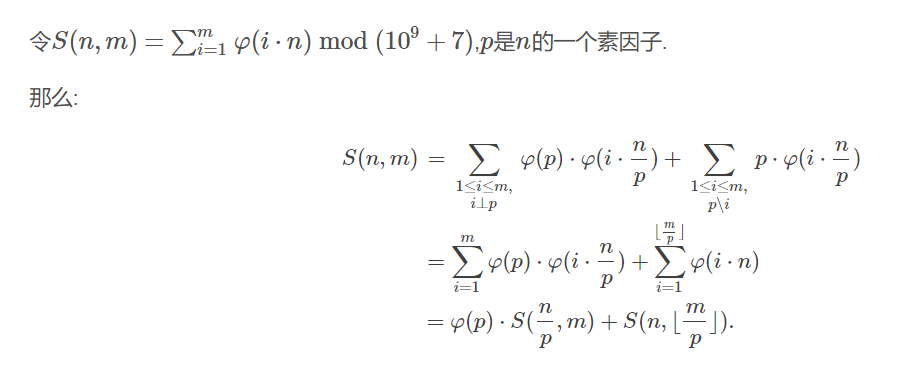HDU - 5728:PowMod (欧拉函数&指数循环节)
Declare:
k=∑ m i=1 φ(i∗n) mod 1000000007 k=∑i=1mφ(i∗n) mod 1000000007
n n is a square-free number.
φ φ is the Euler's totient function.
find:
ans=k k k k ... k mod p ans=kkkk...k mod p
There are infinite number of k k
k=∑ m i=1 φ(i∗n) mod 1000000007 k=∑i=1mφ(i∗n) mod 1000000007
n n is a square-free number.
φ φ is the Euler's totient function.
find:
ans=k k k k ... k mod p ans=kkkk...k mod p
There are infinite number of k k
InputMultiple test cases(test cases ≤100 ≤100
), one line per case.
Each line contains three integers, n,m n,m
and p p
.
1≤n,m,p≤10 7 1≤n,m,p≤107
OutputFor each case, output a single line with one integer, ans.Sample Input
1 2 6 1 100 9
Sample Output
4 7
题意:k=∑ φ(i∗n)%1000000007;求K^(K^(K^....))%P;
思路:第二部分用欧拉降幂一层一层的降。第一部分可以看这里。

就是左边部分 φ(p)=p-1,但是有的部分由于没有i含有p因数,实际是p而不是p-1,所以要把这部分加进去,所以就有了右边部分。
#include<bits/stdc++.h> #define ll long long using namespace std; const int maxn=10000010; int phi[maxn],p[maxn],vis[maxn],cnt; vector<int>G[maxn]; void prime() { phi[1]=1; for(int i=2;i<maxn;i++){ if(!vis[i]) p[++cnt]=i,phi[i]=i-1; for(int j=1;j<=cnt&&p[j]*i<maxn;j++){ vis[p[j]*i]=1; phi[i*p[j]]=phi[i]*phi[p[j]]; if(i%p[j]==0){ phi[i*p[j]]=phi[i]*p[j]; break;} } } } int qpow(int a,int x,int P){ int res=1; while(x){ if(x&1) res=(ll)res*a%P; a=(ll)a*a%P; x>>=1; } return res; } int get(int K,int P) { if(P==1) return 0; return qpow(K,get(K,phi[P])+phi[P],P); } int main() { prime(); int P,ans,T; scanf("%d",&T); while(T--){ scanf("%d",&P); ans=get(2,P); printf("%d\n",ans); } return 0; }
It is your time to fight!





